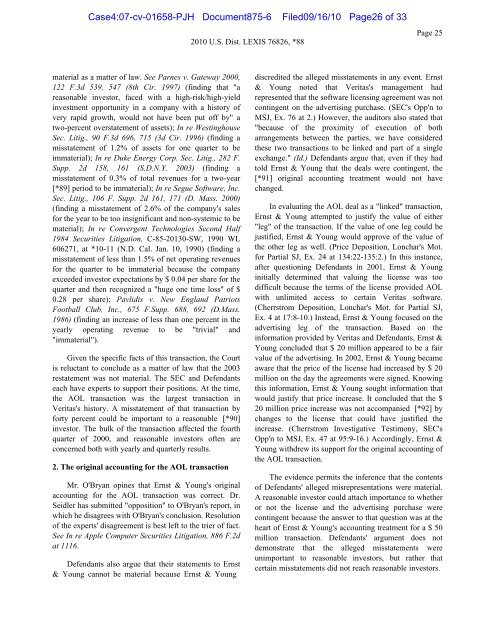exhibit 2 - SAP Lawsuit Portal
exhibit 2 - SAP Lawsuit Portal
exhibit 2 - SAP Lawsuit Portal
Create successful ePaper yourself
Turn your PDF publications into a flip-book with our unique Google optimized e-Paper software.
Case4:07-cv-01658-PJH Document875-6 Filed09/16/10 Page26 of 33<br />
material as a matter of law. See Parnes v. Gateway 2000,<br />
122 F.3d 539, 547 (8th Cir. 1997) (finding that "a<br />
reasonable investor, faced with a high-risk/high-yield<br />
investment opportunity in a company with a history of<br />
very rapid growth, would not have been put off by" a<br />
two-percent overstatement of assets); In re Westinghouse<br />
Sec. Litig., 90 F.3d 696, 715 (3d Cir. 1996) (finding a<br />
misstatement of 1.2% of assets for one quarter to be<br />
immaterial); In re Duke Energy Corp. Sec. Litig., 282 F.<br />
Supp. 2d 158, 161 (S.D.N.Y. 2003) (finding a<br />
misstatement of 0.3% of total revenues for a two-year<br />
[*89] period to be immaterial); In re Segue Software, Inc.<br />
Sec. Litig., 106 F. Supp. 2d 161, 171 (D. Mass. 2000)<br />
(finding a misstatement of 2.6% of the company's sales<br />
for the year to be too insignificant and non-systemic to be<br />
material); In re Convergent Technologies Second Half<br />
1984 Securities Litigation, C-85-20130-SW, 1990 WL<br />
606271, at *10-11 (N.D. Cal. Jan. 10, 1990) (finding a<br />
misstatement of less than 1.5% of net operating revenues<br />
for the quarter to be immaterial because the company<br />
exceeded investor expectations by $ 0.04 per share for the<br />
quarter and then recognized a "huge one time loss" of $<br />
0.28 per share); Pavlidis v. New England Patriots<br />
Football Club, Inc., 675 F.Supp. 688, 692 (D.Mass.<br />
1986) (finding an increase of less than one percent in the<br />
yearly operating revenue to be "trivial" and<br />
"immaterial").<br />
Given the specific facts of this transaction, the Court<br />
is reluctant to conclude as a matter of law that the 2003<br />
restatement was not material. The SEC and Defendants<br />
each have experts to support their positions. At the time,<br />
the AOL transaction was the largest transaction in<br />
Veritas's history. A misstatement of that transaction by<br />
forty percent could be important to a reasonable [*90]<br />
investor. The bulk of the transaction affected the fourth<br />
quarter of 2000, and reasonable investors often are<br />
concerned both with yearly and quarterly results.<br />
2. The original accounting for the AOL transaction<br />
Mr. O'Bryan opines that Ernst & Young's original<br />
accounting for the AOL transaction was correct. Dr.<br />
Seidler has submitted "opposition" to O'Bryan's report, in<br />
which he disagrees with O'Bryan's conclusion. Resolution<br />
of the experts' disagreement is best left to the trier of fact.<br />
See In re Apple Computer Securities Litigation, 886 F.2d<br />
at 1116.<br />
Defendants also argue that their statements to Ernst<br />
& Young cannot be material because Ernst & Young<br />
2010 U.S. Dist. LEXIS 76826, *88<br />
Page 25<br />
discredited the alleged misstatements in any event. Ernst<br />
& Young noted that Veritas's management had<br />
represented that the software licensing agreement was not<br />
contingent on the advertising purchase. (SEC's Opp'n to<br />
MSJ, Ex. 76 at 2.) However, the auditors also stated that<br />
"because of the proximity of execution of both<br />
arrangements between the parties, we have considered<br />
these two transactions to be linked and part of a single<br />
exchange." (Id.) Defendants argue that, even if they had<br />
told Ernst & Young that the deals were contingent, the<br />
[*91] original accounting treatment would not have<br />
changed.<br />
In evaluating the AOL deal as a "linked" transaction,<br />
Ernst & Young attempted to justify the value of either<br />
"leg" of the transaction. If the value of one leg could be<br />
justified, Ernst & Young would approve of the value of<br />
the other leg as well. (Price Deposition, Lonchar's Mot.<br />
for Partial SJ, Ex. 24 at 134:22-135:2.) In this instance,<br />
after questioning Defendants in 2001, Ernst & Young<br />
initially determined that valuing the license was too<br />
difficult because the terms of the license provided AOL<br />
with unlimited access to certain Veritas software.<br />
(Cherrstrom Deposition, Lonchar's Mot. for Partial SJ,<br />
Ex. 4 at 17:8-10.) Instead, Ernst & Young focused on the<br />
advertising leg of the transaction. Based on the<br />
information provided by Veritas and Defendants, Ernst &<br />
Young concluded that $ 20 million appeared to be a fair<br />
value of the advertising. In 2002, Ernst & Young became<br />
aware that the price of the license had increased by $ 20<br />
million on the day the agreements were signed. Knowing<br />
this information, Ernst & Young sought information that<br />
would justify that price increase. It concluded that the $<br />
20 million price increase was not accompanied [*92] by<br />
changes to the license that could have justified the<br />
increase. (Cherrstrom Investigative Testimony, SEC's<br />
Opp'n to MSJ, Ex. 47 at 95:9-16.) Accordingly, Ernst &<br />
Young withdrew its support for the original accounting of<br />
the AOL transaction.<br />
The evidence permits the inference that the contents<br />
of Defendants' alleged misrepresentations were material.<br />
A reasonable investor could attach importance to whether<br />
or not the license and the advertising purchase were<br />
contingent because the answer to that question was at the<br />
heart of Ernst & Young's accounting treatment for a $ 50<br />
million transaction. Defendants' argument does not<br />
demonstrate that the alleged misstatements were<br />
unimportant to reasonable investors, but rather that<br />
certain misstatements did not reach reasonable investors.


